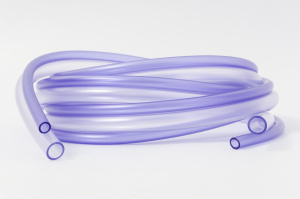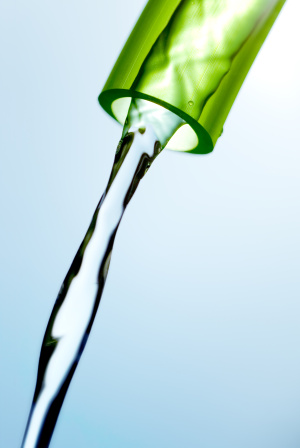
 PVC tubing, also known as polyvinyl chloride tubing, is a versatile and widely used material in various industries and applications. It is a type of plastic tubing that is made from a combination of vinyl chloride monomers and additives. PVC tubing is known for its durability, flexibility, and resistance to chemicals, making it suitable for a wide range of uses. It is also available in a variety of formulations to help meet strict regulatory requirements like Reach and RoHS. These include Non-DEHP and Non-Phthalate variations.
PVC tubing, also known as polyvinyl chloride tubing, is a versatile and widely used material in various industries and applications. It is a type of plastic tubing that is made from a combination of vinyl chloride monomers and additives. PVC tubing is known for its durability, flexibility, and resistance to chemicals, making it suitable for a wide range of uses. It is also available in a variety of formulations to help meet strict regulatory requirements like Reach and RoHS. These include Non-DEHP and Non-Phthalate variations.
PVC tubing is widely used in the medical and healthcare industry. It is commonly used as intravenous (IV) tubing, oxygen tubing, and catheters. PVC tubing in medical applications is designed to be sterile, non-toxic, and biocompatible. It is flexible and easy to handle, allowing for comfortable and efficient use in various medical procedures This makes it an ideal choice for medical tubing and medical devices.
One of the primary uses of PVC tubing is in plumbing and construction. It is commonly used for water supply lines, drainage systems, and irrigation systems. PVC tubing is preferred in these applications due to its ability to withstand high water pressure, its resistance to corrosion and rust, and its ease of installation. Additionally, PVC tubing is lightweight, making it easier to handle and transport compared to other materials such as metal pipes.
Another significant application of PVC tubing is in the electrical industry. PVC tubing is used for electrical wiring and cable management due to its excellent insulation properties. It provides protection to electrical wires and cables, preventing damage from moisture, chemicals, and physical impact. PVC tubing is also flame retardant, making it a safe choice for electrical installations.
In the automotive industry, PVC tubing is used for various purposes. It is commonly used for fuel lines, brake lines, and vacuum lines. PVC tubing in automotive applications is resistant to chemicals and fuels, ensuring the safe and efficient transport of fluids. It is also flexible and easy to bend, allowing for easy installation in tight spaces.
PVC tubing is also utilized in the agricultural sector. It is commonly used for irrigation systems, water supply lines, and drainage systems in farms and agricultural fields. PVC tubing is resistant to UV rays, chemicals, and weathering, making it suitable for outdoor use. Its durability and low maintenance requirements make it a cost-effective choice for agricultural applications.
Furthermore, PVC tubing is used in various recreational and leisure activities. It is commonly used for swimming pool plumbing, spa and hot tub installations, and water parks. PVC tubing is resistant to chlorine and other chemicals commonly found in water treatment systems, ensuring its longevity and performance in these applications.PVC tubing, also known as polyvinyl chloride tubing, is a versatile and widely used material in various industries and applications. It is a type of plastic tubing that is made from a combination of vinyl chloride monomers and additives. PVC tubing is known for its durability, flexibility, and resistance to chemicals, making it suitable for a wide range of uses.

Feature 1: High Flow Performance
Feature 2: Corrosion Resistant
Feature 3: Long Lasting
Feature 4: Lightweight
Feature 5: Multiple Color Choices Available
Application 1: Airlines
Application 2: Automotive
Application 3: Chemical Transfer
Application 4: Medical Tubing
Application 5: Surgical Tubing
Application 6: Catheter Tubing
Application 7: Fluid Feeds and Transfer
Application 8: Food & Beverage Industry
Application 9: Fuel and Oil Industry
Application 10: General Industrial
Application 11: Hospitals and Laboratories
Application 12: Instrumentation
Application 13: Medical Devices
Application 14: Pharmaceutical Processing
Application 15: Pools and Spas
Application 16: Potable Water Systems
Application 17: Wire Jacketing